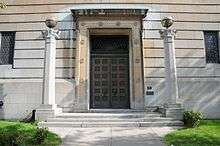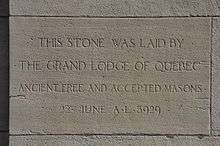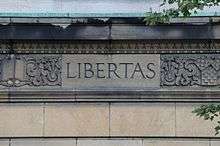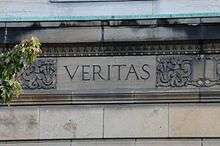Montreal Masonic Memorial Temple
| Montreal Masonic Memorial Temple | |
|---|---|
| Temple maçonnique de Montréal | |
|
Montreal Masonic Memorial Temple | |
| Alternative names |
Grand Lodge of Quebec French: Grande loge du Québec |
| General information | |
| Status | Operational |
| Architectural style | Beaux-Arts |
| Location | Downtown Montreal |
| Address | 2295 Saint-Marc Street and 1805 Sherbrooke Street West |
| Town or city | Montreal, Quebec |
| Country | Canada |
| Coordinates | 45°29′41″N 73°34′59″W / 45.494645°N 73.582982°W |
| Current tenants | Various Masonic Lodges, Julien-Leblanc Traiteur and Centre De La Petite Enfance Genesis 87 |
| Construction started | 1929 |
| Completed | 1930 |
| Inaugurated | June 22, 1929 |
| Owner | Masonic Foundation of Quebec |
| Landlord | Masonic Foundation of Quebec |
| Height | |
| Top floor | 7 |
| Technical details | |
| Lifts/elevators | 2 |
| Design and construction | |
| Architect | John Smith Archibald |
| Awards and prizes | Royal Architectural Institute of Canada First Award, Class I, Monumental Buildings |
| Designated | 2001 |
| Type | Immeuble patrimonial classé |
| Designated | 2012 |
The Montreal Masonic Memorial Temple (French: Temple maçonnique de Montréal) is an historic masonic temple in Montreal, Quebec, Canada, on the corner of Sherbrooke Street and St-Marc Street, in the Golden Square Mile district. Dedicated and officially opened June February 12, 1930, it was designated a National Historic Site of Canada in 2001, as an example of one of Canada’s most elegant buildings in the Beaux-Arts style.[1][2][3]
History

The Masonic Memorial Temple was conceived as a meeting place for the Masonic order as well as a memorial to Freemasons who gave their lives during World War I, replacing a Masonic Temple that had existed in a mixed-use building on Dorchester Street since 1895. The order had renovations done in 1908 and began to raise funds for a new building in 1923. In 1928, they contracted architect John Smith Archibald, who had previously renovated the Dorchester Street Temple, to design a new temple and supervise its construction.
The ceremonial laying of the cornerstone took place on June 22, 1929, with thirty-six lodges and 2,000 Masons parading to the new temple from the Dorchester Street Temple. The Grand Lodge of Quebec met for the first time in the new temple on February 12, 1930, at its Sixtieth Annual Communication, on February 12, 1930. The temple commemorates Masons who died in the First and Second World Wars and the Korean War.[4]
Architect
Born and trained in architecture in Inverness, Scotland, Archibald came to Canada in 1893 under the employ of Edward Maxwell. Archibald and his colleague Charles Saxe then started their own firm until 1915. From 1915 until his death in 1934, Archibald mainly practiced alone. His major projects included a number of prominent hotels, such as additions to the Windsor Hotel, Château Laurier, Halifax Hotel, and the Hotel Vancouver. Other prominent commissions included the Montreal Forum, Baron Byng High School, Elizabeth Ballantyne School, the Queen’s University Gymnasium and Swimming Pool, Kingston (1930) and three Montreal hospitals: the Royal Edward Institute, the Montreal Convalescent Hospital and St. Mary’s Hospital.[4]
Design



The facades on Sherbrooke and St-Marc streets and are covered with Queenston limestone. The main facade, on Sherbrooke, has a base made of rusticated limestone and features four openings as well as a prominent central entrance, flanked by two free-standing columns topped by terrestrial and celestial spheres. The main door is made of detailed architectural bronze. A decorative belt course defines the upper part of the base and consists of ornamental carving and words in relief: FIDES, VERITAS, CARITAS, LIBERTAS, SPES ("Faith", "Truth", "Charity", "Liberty", and "Hope" in Modern English).
A December 1930 issue of Construction, "A Journal for the architectural, engineering and contracting interests of Canada" featured an illustrated article, praised the Temple:
Neither our great Canadian classicists nor such well-known American practitioners as McKim, Mead and White have produced anything finer in Grecian adaptation than this Montreal building. As a work of architectural merit it ranks with Henry Bacon’s Lincoln Memorial , John Russell Pope’s Temple of the Scottish Rite and McKim, Mead and White’s J.P. Morgan Library. The modern Canadian buildings that are nearest to its class are Cobb’s Toronto Registry Office and Lyle’s Bank of Nova Scotia, at Ottawa.
One year later, the Royal Architectural Institute of Canada gave its First Award, Class I, Monumental Buildings, to the Montreal temple.
Conservation Project
On January 30 2010, the Honourable W. David Angus, Senator, has announced that the Government of Canada is delivering infrastructure funding of $425'000 to the Masonic Memorial Temple National Historic Site of Canada. [5]
References
- ↑ Masonic Memorial Temple National Historic Site of Canada. Canadian Register of Historic Places. Retrieved August 4, 2011.
- ↑ "THE GOVERNMENT OF CANADA COMMEMORATES THE NATIONAL HISTORIC SIGNIFICANCE OF THE MONTREAL MASONIC MEMORIAL TEMPLE". Parks Canada News Release. Government of Canada. 14 October 2006. Retrieved 2009-01-07.
- ↑ Parks Canada: Directory of Designations of National Historic Significance of Canada: Masonic Memorial Temple National Historic Site of Canada, Montréal, Quebec
- 1 2 Scott, Marian (17 May 2013). "The Masons to reveal some of their inner workings". Montreal Gazette. Retrieved 18 May 2013.
- ↑ "Canada's Economic Action Plan Invests in Heritage Infrastructure at the Masonic Memorial Temple National Historic Site of Canada". Parks Canada News Release. Government of Canada. 30 January 2010. Retrieved 2010-03-25.
External links
| Wikimedia Commons has media related to Montreal Masonic Memorial Temple. |
Coordinates: 45°29′41″N 73°34′59″W / 45.4947°N 73.5830°W